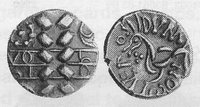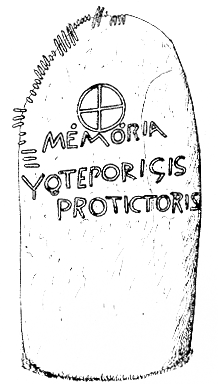BabelStone Blog
Tuesday, 23 May 2006
Barbarians at the Breakfast Table
Opening up my newly-arrived copy of ex-Python Terry Jones' book of the BBC 2 TV series, Barbarians, at random on page 29 this morning, I almost choked on my coffee as I read that :
Archaeologists have found many thousands of inscriptions in Celtic languages from the years before Julius Caesar. The alphabet used is sometimes Latin, sometimes Greek, and sometimes their own alphabet, called Ogham.
There is indeed a quite large corpus of Celtic inscriptions from the late Roman and post-Roman periods, but as far as I am aware there is very little material dating from the years before Julius Caesar, which for argument's sake we'll take as prior to Caesar's first invasion of Britain in 55 B.C. There are the odd scraps of writing here and there, largely resticted to proper names, but the historians on my rather limited bookshelf seem to agree that the early Celts were not prolific writers :
From at least the second century B.C. inscriptions copied from the Greek prototype coins, and later, independent inscriptions in Greek or Roman characters, are found on continental Celtic coinage, and from about 50 B.C. there is a British inscribed coinage, normally giving the name of the tribal rulerand his mint in abbreviated form ... Caesar refers to the occasional use of Greek letters by the Druids, and a late La Tène sword from Switzerland has not only the swordsmith's stamp on it, but his name KORISIOS in Greek characters. Some graffiti scratched on sherds from the Magdalenensburg in Austria may represent a Celtic use of a debased Etruscan alphabet in the first century B.C., and in Camulodunum (Colchester) graffiti on pots in Roman letter go back to the pre-Roman period. But by and large writing was not a Celtic accomplishment, nor need it have been in a society where song and story, law and genealogy, were safely transmitted by an active and effective oral tradition, and political or mercantile affairs were not so complex as to need the written record.
Stuart Piggott, Ancient Europe pp.253-255.
The critical difference between Roman Britain and what went before is that its society was literate ... Then [at the end of the Iron Age], even at the top of the social scale, where the import of Roman luxury goods was a notable feature, writing was totally absent except on the splendid but limited coinage—and even on that the language employed was almost universally Latin and the moneyers themselves often Roman.
Peter Salway, "Roman Britain", in The Oxford Illustrated History of Britain p.2.
So where then are these thousands of pre-55 B.C. Celtic inscriptions that reputable historians such as Professor Piggot seem to have totally missed ? There are a fair number of inscribed Gaulish coins from this period, although significantly there are no inscribed British coins until after Caesar's visits to our shores, but I cannot think that this is what Terry Jones or his co-author, Alan Ereira, were thinking of.
Coin of Volisios Dumnocoveros of the Coritani tribe (circa 35 AD)

As to monumental inscriptions, there are many hundreds of inscriptions from the Celtic-speaking areas of Britain, Ireland and France that date from the late Roman period through to the early Mediaeval period, mostly written in Latin or Ogham script. The Celtic Inscribed Stones Project has a database of about 1,200 inscribed stones from the period 400-1000, although many are written in Latin, so the number of Celtic-language inscriptions must be well under a thousand ... and of these, very few consist of more than a just a personal name. As far as I am aware there is not a single Celtic-language monumental inscription dating from Iron Age Britain, and if there are any continental examples they are few and far between.
Thus the claim that archaeologists have discovered thousands of Celtic-language inscriptions from before the time of Julius Caesar is patently absurd. Moreover, the casual inclusion of Ogham in this corpus of imaginary inscriptions is laughable, as the earliest Ogham inscriptions do not date to before the fourth century AD.
The memorial stone of Vortiporix, an early 6th century King of the Demetae

(His name is inscribed around the edge of the stone in Ogham as VOTECORIGAS)
On the basis of the historical incompetence exhibited in the book, I think that I shall stick to the traditional Friday night fare of Have I Got News for You and Smith & Jones rather than waste my time watching Terry Jones expound upon the Primative Celts.
Books | Numismatics | Ogham
Index of BabelStone Blog Posts